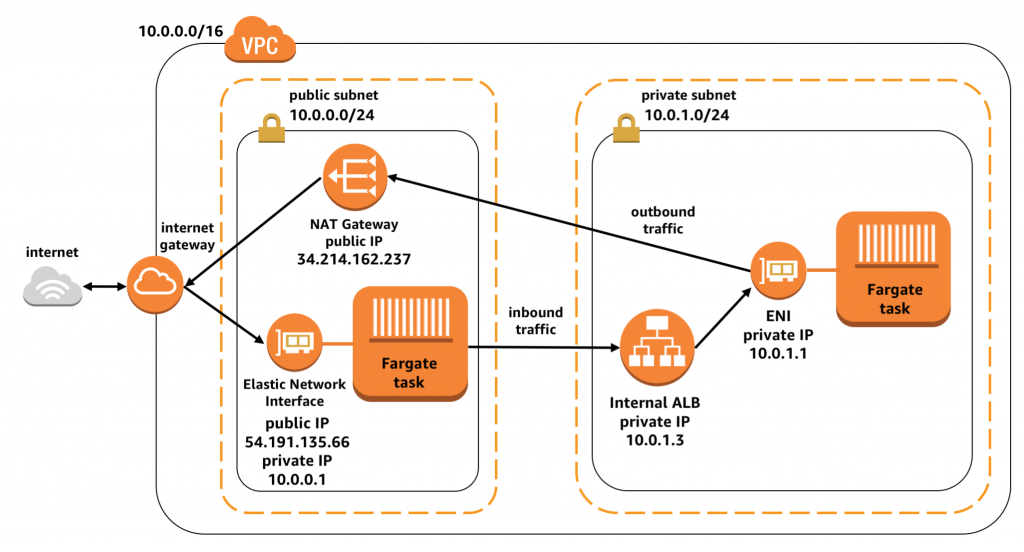AWS Compute Blog
Tag: Amazon ECS
Migrating Your Amazon ECS Containers to AWS Fargate
AWS Fargate is a new compute engine that works with Amazon Elastic Container Service (ECS) to run containers without having to manage servers or clusters. What does this mean? With Fargate, you no longer need to provision or manage a single virtual machine; you can just create tasks and run them directly! Fargate uses the same API actions as ECS, […]
Task Networking in AWS Fargate
AWS Fargate is a new compute engine for containers that allows you to focus on running your application without needing to provision, monitor, or manage the underlying compute infrastructure. You package your application into a Docker container that you can then launch using your container orchestration tool of choice. Fargate allows you to use containers […]
Building Blocks of Amazon ECS
So, what’s Amazon Elastic Container Service (ECS)? ECS is a managed service for running containers on AWS, designed to make it easy to run applications in the cloud without worrying about configuring the environment for your code to run in. Using ECS, you can easily deploy containers to host a simple website or run complex […]
Migrating .NET Classic Applications to Amazon ECS Using Windows Containers
This post contributed by Sundar Narasiman, Arun Kannan, and Thomas Fuller. AWS recently announced the general availability of Windows container management for Amazon Elastic Container Service (Amazon ECS). Docker containers and Amazon ECS make it easy to run and scale applications on a virtual machine by abstracting the complex cluster management and setup needed. Classic .NET […]
Set Up a Continuous Delivery Pipeline for Containers Using AWS CodePipeline and Amazon ECS
This post contributed by Abby Fuller, AWS Senior Technical Evangelist Last week, AWS announced support for Amazon Elastic Container Service (ECS) targets (including AWS Fargate) in AWS CodePipeline. This support makes it easier to create a continuous delivery pipeline for container-based applications and microservices. Building and deploying containerized services manually is slow and prone to errors. Continuous delivery […]
Running Windows Containers on Amazon ECS
This post was developed and written by Jeremy Cowan, Thomas Fuller, Samuel Karp, and Akram Chetibi. — Containers have revolutionized the way that developers build, package, deploy, and run applications. Initially, containers only supported code and tooling for Linux applications. With the release of Docker Engine for Windows Server 2016, Windows developers have started to […]
The re:Invent 2017 Containers After-party Guide
Feeling uncontainable? re:Invent 2017 might be over, but the containers party doesn’t have to stop. Here are some ways you can keep learning about containers on AWS. Learn about containers in Austin and New York Come join AWS this week at KubeCon in Austin, Texas! We’ll be sharing best practices for running Kubernetes on AWS […]
AWS Fargate: A Product Overview
It was just about three years ago that AWS announced Amazon Elastic Container Service (Amazon ECS), to run and manage containers at scale on AWS. With Amazon ECS, you’ve been able to run your workloads at high scale and availability without having to worry about running your own cluster management and container orchestration software. Today, […]
AWS re:Invent 2017 Guide to All Things Containers
Contributed by Tiffany Jernigan, Developer Advocate for Amazon ECS Get ready for takeoff! We made sure that this year’s re:Invent is chock-full of containers: there are over 40 sessions! New to containers? No problem, we have several introductory sessions for you to dip your toes. Been using containers for years and know the ins and outs? […]
Capturing Custom, High-Resolution Metrics from Containers Using AWS Step Functions and AWS Lambda
Contributed by Trevor Sullivan, AWS Solutions Architect When you deploy containers with Amazon ECS, are you gathering all of the key metrics so that you can correctly monitor the overall health of your ECS cluster? By default, ECS writes metrics to Amazon CloudWatch in 5-minute increments. For complex or large services, this may not be sufficient to make […]








